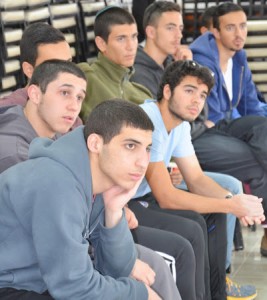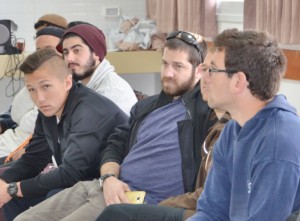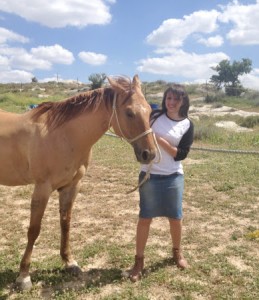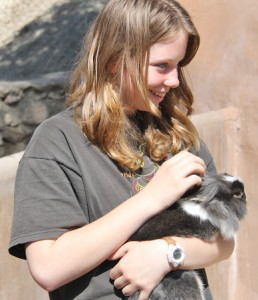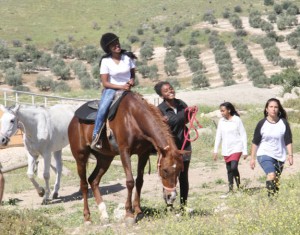by Zvi Volk
The week before Pesach when most Israeli teens were either helping clean the house or going on tiyulim with their youth groups, teens from the Jack E. Gindi Oraita Youth Clubs and Makom Balev had a very different kind of experience.
They visited Retorno, an inpatient rehabilitation center near Bet Shemesh, about 25 miles from Jerusalem, or in Moshav Keshet in the Golan Heights.
Each group visited the centers for a day. “We try to have all of our teens from all over the country participate in a program at Retorno,” says Chaim Pelzner, Director of Programming for OU Israel. “This is a very deep experience for them.”
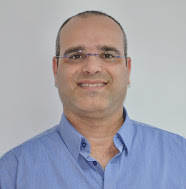
Oraita works with the second step and beyond, he says. “The second step is to teach them to be willing to give something to society. Not just, “give me,” rather, “what can I give. How can I progress in life?”
“One of the things we’ve discovered really touches their souls is the process that people go through at Retorno.”
Visit to Retorno
The day at Retorno begins with an introduction to the way Retorno works, who comes there and what addiction is.
The week before Pesach one group of boys from Ariel was introduced to the subject of addiction by Yehuda, a Retorno staff member. He explained that in addition to drugs and alcohol, people can be addicted to many things including sex, the Internet, and food.
Yehuda explained that, “everyone has to deal with some sort of pain in life. You try to feel better.” Some people can work through the pain; others try a variety of substances of which alcohol and drugs are the most common.
He introduced the group to Dvir, 21, who grew up one of eight siblings in a religious family north of Haifa.
Dvir told the group his life story which led up to his coming to Retorno. It was a very painful story that involved running away, smoking and drinking from an early age. As he got older, the drugs got more serious and he was becoming a criminal.
He would be arrested, released and arrested again. “I didn’t have any boundaries,” he told the group. “I didn’t trust anyone. I couldn’t relate to other people.”
He told them about going home, going to yeshivah, going to Eilat. But he kept getting into trouble. “My life was based on stealing, lying and drugs.”
What the group found ironic is when Dvir explained that even during his worst period, he was Shomer Shabbat: “I would put on my tefillin in the morning and rob houses in the afternoon.”
By the time he was 18 he went to prison for two years. A short time after he got out he was arrested again.
“I didn’t want to be in treatment because I didn’t trust myself,” he says. But almost six months ago he arrived at Retorno. He has now been clean for 10 months.
The group was impressed. Nevertheless, the boys who met Dvir found his life story to be shocking and depressing.
“These kids never expected to meet someone with such a difficult story to tell,” says Nitay Aharoni, an Oraita madrich. “This isn’t the kind of person they have ever met. The fact that they could sit for an hour and a half without moving is very unusual.”
Oraita teens’ reactions
“Dvir’s story was very sad because of the addiction,” says Michael, 16 ½. “He made me realize how important it is to be with the right people and in the right areas. And also to stay away from alcohol and drugs.”
When Michael went to see people working with animals, he didn’t understand the connection at first. “They explained that working with animals is very relaxing. It also helps you learn how to treat people better,” Michael said.
Dan, 18, had never heard a life story like Dvir’s. “When a person like that opens up and expresses his emotions in front of a group of strangers, it’s very surprising.” Dvir is just three years older than Dan. “He has had such a hard life yet he’s willing to tell his life story to people he doesn’t know. He helped me learn to respect life more.”
Thousands come to Retorno
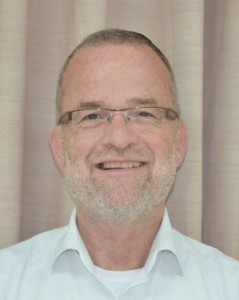
New programs abound. Inpatient, outpatient, and day-long programs. Visitors include soldiers, teachers, and a variety of professionals. Thousands of people visit Retorno every year – both near Bet Shemesh and in Keshet in the Golan Heights.
Rabbi Eckstein began the program in Mexico in 1989 where he was a community rabbi. He sensed a need for a Jewish framework to treat addiction. The program relocated to Israel in 1998 when Rabbi Eckstein returned.
“When I first started this program in Israel, people told me not to work with the religious public because no religious people have problems with addiction. And if they do, they’ll be too embarrassed to ask for treatment.”
Today there is a three month waiting list at Retorno, which is described as the world’s largest Jewish rehabilitation center. Shabbat and Jewish holidays are observed, food is strictly kosher, and daily davening and Torah classes create an enriching spiritual environment. Davening and shiurim are not mandatory.
What do teens like the Oraita group get from a visit to Retorno?
“We know from Israeli welfare agencies that about 10 percent of Israeli teens use drugs,” Rabbi Eckstein says. “Another 30 percent drink alcohol. I’m talking about those who do so regularly – once a week or twice a month.”
“We also know that kids who go through a life crisis have a good chance of ending up on drugs because drugs help them ‘act out.’”
Rabbi Eckstein explains that, “the problem with most drug prevention programs is that they tell teens what not to do: Don’t use drugs. They’re dangerous. It’s against the law.”
“We know that people who use drugs have a good reason for doing so. But in the end, it won’t help solve their problems. There’s another way: to talk, to look for help.”
“When kids come here we don’t tell them what to do. They hear from people who tell them, ‘I lost my way, until I realized how much I was suffering.’ There is another way. This type of message is much stronger,” he says.
Making decisions
“Kids have to make decisions,” Pelzner says. “Decisions like, ‘I want to be a better person.’ Or, ‘I want to progress.’ At Oraita we’ve developed a philosophy that every teen should feel a sense of belonging to a group,” he says. “We do this with our 20 youth groups around the country. Sometimes a kid doesn’t feel significant enough within the group. And then the question is how much they can progress.”
“Kids have to have a significant role in their group,” he says. “That’s what we try to teach them with Retorno: How do I progress? How do I overcome my problems?
“We try to get kids to build on their strengths and channel them in positive ways,” Pelzner says. “Retorno is one of the important tools in the way we educate youth. We tell them not to be embarrassed by their weak points, and not to give in to them. They have to learn how to build something better and stronger.”

